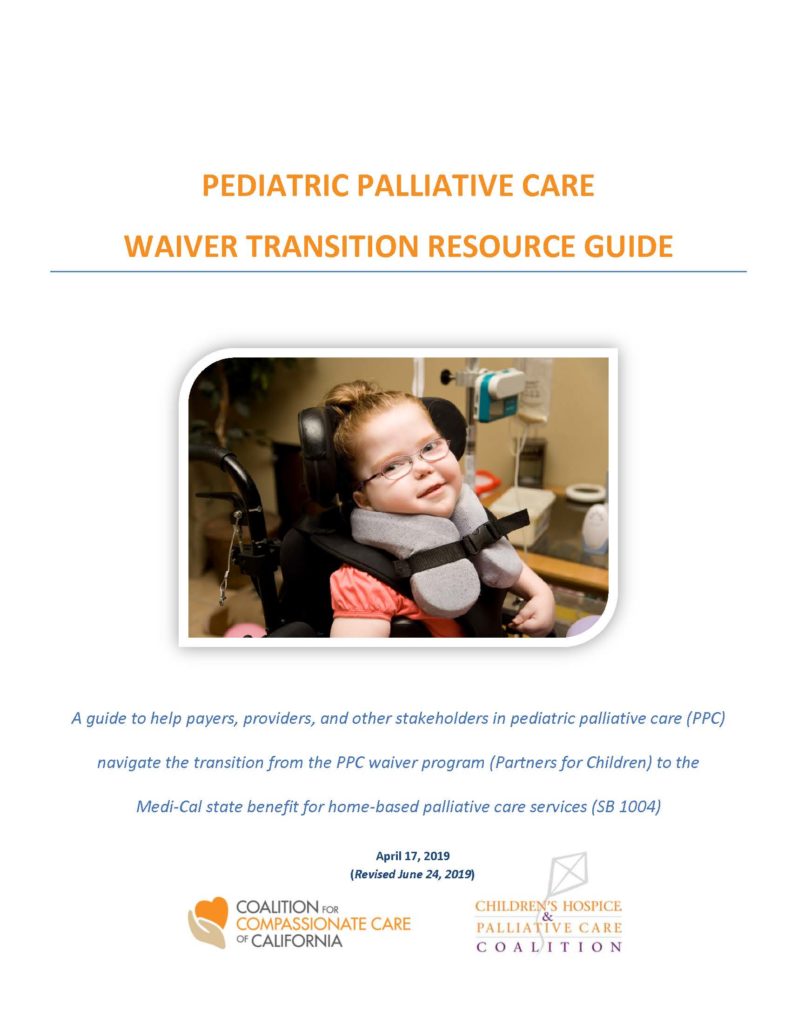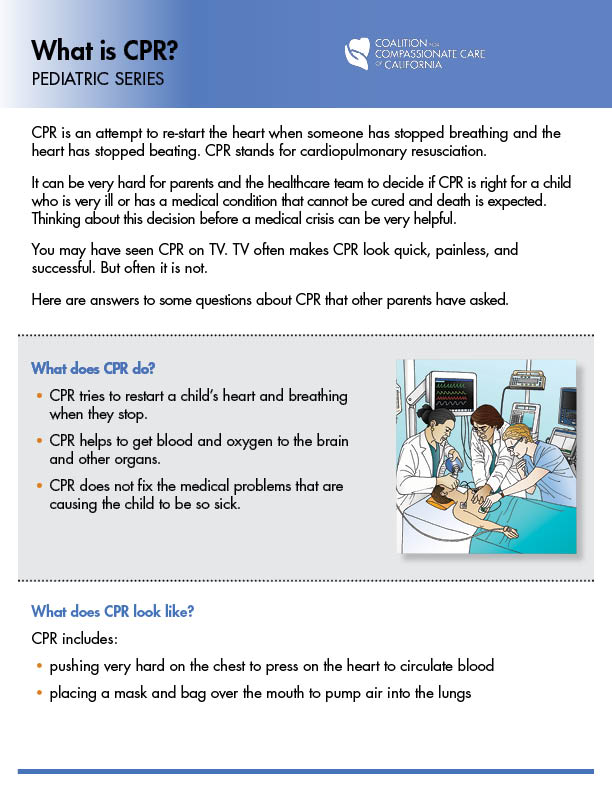The Coalition for Compassionate Care of California works toward its vision that Californians of all ages are able to live well in the face of serious illness, including children, adolescents, and adults. CCCC champions and supports pediatric palliative care through activities that are a natural component of its broader work, including POLST for pediatrics and pediatric decision aids.
Background
As of January 1, 2019, California’s Pediatric Palliative Care (PPC) waiver and the Partners for Children pediatric palliative care program are discontinued, and pediatric palliative care services delivery has been moved under Medi-Cal fee-for-service and managed care plans through SB 1004 and EPSDT (Early and Periodic Screening, Diagnosis, and Treatment).
State Revises Pediatric Palliative Care Options (June 2019)
 The California Department of Health Care Services (DHCS) released a revised version of NL 16-1218, the Numbered Letter pertaining to Pediatric Palliative Care (PPC), dated April 9, 2019. NL 16-1218 makes California Children’s Services (CCS) responsible for PPC when the PPC is part of the treatment plan of a Special Care Center (SCC). CCCC worked closely with provider agencies, county CCS programs, and Managed Care Plans (MCPs) to help determine how this communication from DHCS affects referrals, authorizations, reimbursements, and the delivery of PPC services.
The California Department of Health Care Services (DHCS) released a revised version of NL 16-1218, the Numbered Letter pertaining to Pediatric Palliative Care (PPC), dated April 9, 2019. NL 16-1218 makes California Children’s Services (CCS) responsible for PPC when the PPC is part of the treatment plan of a Special Care Center (SCC). CCCC worked closely with provider agencies, county CCS programs, and Managed Care Plans (MCPs) to help determine how this communication from DHCS affects referrals, authorizations, reimbursements, and the delivery of PPC services.
An online Pediatric Palliative Care Waiver Transition Resource Guide was developed by the CCCC in response to the January 1, 2019, transition. The guide is intended to support managed care plans and providers as they navigate this change and to ensure a smooth transition for the pediatric members who were being served under the waiver. We want to acknowledge DHCS, Medi-Cal managed care plans, pediatric palliative care providers, and numerous clinicians and other stakeholders throughout the state for their valuable input.
History of PPC Waiver in California
California was one of the first states to respond to the need for comprehensive pediatric palliative care. The Nick Snow Children’s Hospice and Palliative Care Act of 2006 (Assembly Bill 1745) required DHCS to submit a Medicaid (or Medi-Cal as it’s referred to in California) Home and Community-Based Services (HCBS) waiver that would enable eligible children and their families to receive in-home palliative care services during the course of the child’s illness, while concurrently pursuing curative treatment for the child’s life-limiting or life-threatening medical condition.
The waiver was first approved as a pilot project in December 2008, and established the Partners for Children (PFC) Program within the Service of Care Division (SCD) of DHCS. The waiver was based on the principle that if curative treatment is provided along with palliative care, irrespective of life-expectancy projections, there can be an effective continuum of care throughout the course of the participant’s medical condition. Under the waiver, children had access to an array of home-based palliative care services, including intensive care coordination, pain and symptom management, expressive therapies (i.e., massage, art, music, and child-life), and family counseling, without electing to receive hospice care. Services were provided by licensed hospice and home health agencies.
In March 2017, new Conflict of Interest (COI) guidelines from the Centers for Medicaid and Medicare (CMS) prohibited any agency responsible for care coordination and case management from also providing direct care services. These new requirements proved to be too restrictive to allow home-based providers to continue providing PPC under the waiver. With funding from the California Health Care Foundation, CCCC convened stakeholder groups to brainstorm solutions to the challenges posed by the new COI. Despite the recommendations that stemmed from the stakeholder meetings, CMS declined to modify the guidelines, and in 2018, DHCS, in communication with CCCC and other stakeholders, made the decision to not pursue renewal of the PPC waiver and to work with providers to deliver comparable PPC services to children and their families under Medi-Cal.
SB 1004 and the PPC Waiver Transition
California Senate Bill 1004 (SB 1004), implemented on January 1, 2018, required DHCS to establish a framework for Medi-Cal beneficiaries of all ages to receive palliative care services. The initial All Plan Letter (APL) developed to support the implementation of SB 1004 under Medi-Cal Managed Care was adult-centric, but on December 7, 2018, the APL was amended to include eligibility requirements and language specific to children. It went into effect on January 1, 2019, and requires the provision of home-based palliative care services to eligible pediatric patients whether they are enrolled with a managed care plan or are under Medi-Cal fee-for-service.
Resources
DHCS Letters
DHCS has published the following letters to guide plans and providers through the transition and ensure that California children and their families continue to have access to critical home-based PPC services.
APL 18-020: Palliative Care (December 7, 2018)
NL 16-1218 (Revised) Palliative Care Options for CCS Eligible Children (April 8, 2019)
 Pediatric Decision Aids
Pediatric Decision Aids
Pediatric Decision Aids are an educational series designed by CCCC that help explain the complex topics of life-sustaining treatments, using consumer-friendly language with evidence-based information. The Aids were developed with the help and guidance of healthcare professionals, and reflect the latest research on these interventions. The Aids are recommended for use by healthcare professionals who treat seriously-ill patients in hospitals, palliative care units, skilled nursing facilities, hospices, and medical groups. The Aids are intended to supplement conversations between patients and healthcare providers.
PEDIATRIC TOPICS INCLUDE: breathing machines, cardiopulmonary resuscitation (CPR), and tube feeding.
Purchasing
Decision Aids are available for purchase in packs of 25 through CCCC's Online Store.
Published Research
A selection of research and whitepapers based on our work in pediatric palliative care.